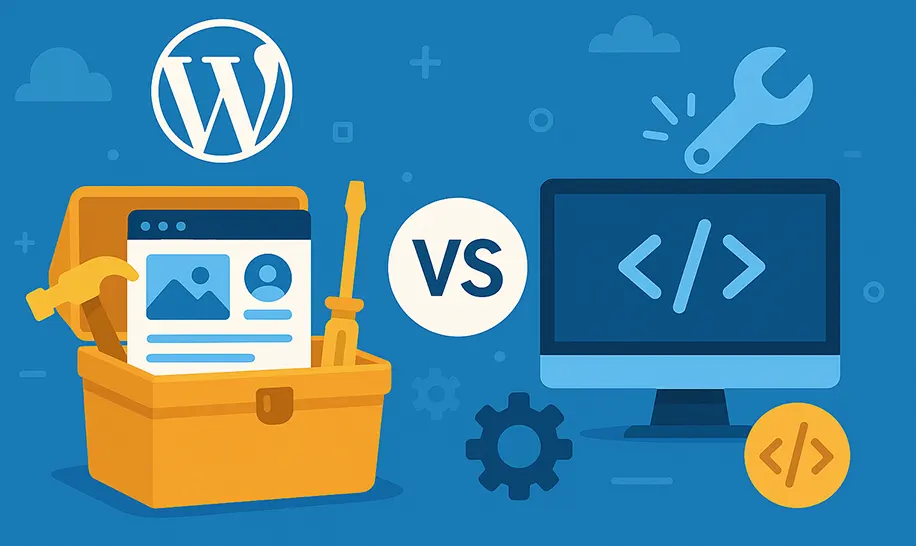
WordPress vs. Custom Development: Which is Right for You?
In today's digital world, having a strong online presence is critical for businesses and individuals alike. When it comes to building a website, one of the most important decisions you'll face is choosing between a WordPress website or going for custom web development. Both options offer unique benefits and limitations depending on your goals, budget, technical know-how, and long-term strategy.
This comprehensive guide will help you understand the key differences, advantages, and disadvantages of each approach so you can make the best decision for your specific needs.
What is WordPress?
WordPress is the world's most popular content management system (CMS), powering over 40% of all websites on the internet. Originally designed for blogging, it has evolved into a versatile platform used for everything from small business websites to eCommerce stores and news portals.
There are two versions:
- WordPress.com (hosted platform)
- WordPress.org (self-hosted, open-source software)
In this guide, we are mainly referring to WordPress.org, the more flexible and developer-friendly version.
What is Custom Web Development?
Custom web development refers to building a website from scratch using programming languages and frameworks such as HTML, CSS, JavaScript, PHP, Python, Ruby on Rails, React, or Laravel. It provides full control over the design, structure, features, and performance of the website.
This approach is often used by larger businesses, startups with unique needs, or individuals who want a tailored web solution that isn't confined by pre-built templates or plugins.
Key Comparison: WordPress vs. Custom Development
Let's explore how both stack up across various critical aspects:
1. Cost and Budget
- WordPress: Ideal for those with a limited budget. You can start with a free theme and inexpensive hosting (as low as $5/month). Premium themes and plugins can add up, but overall, it's budget-friendly.
- Custom Development: More expensive upfront. Hiring developers to build your site from scratch can cost anywhere from $2,000 to $100,000+ depending on complexity. However, you may save on plugin licensing fees over time.
Verdict: WordPress wins for budget-conscious users.
2. Time to Launch
- WordPress: Quick to set up. With a ready-made theme and plugins, you can launch a simple website in a few hours to days.
- Custom Development: Takes longer to design, develop, test, and deploy — usually weeks or months.
Verdict: WordPress is faster to launch.
3. Design and Customization
- WordPress: Offers thousands of themes and visual page builders like Elementor. However, deep customization may require coding knowledge or developer assistance.
- Custom Development: 100% customizable. You're not limited by pre-made themes or plugin capabilities. Ideal for unique UX/UI requirements.
Verdict: Custom development offers complete design flexibility.
4. Scalability and Performance
- WordPress: Suitable for small to medium-sized websites. However, performance may degrade with too many plugins or high traffic unless properly optimized.
- Custom Development: Built for scalability. You can tailor performance optimization, database queries, and caching strategies specifically for your needs.
Verdict: Custom sites scale better in the long run.
5. Security
- WordPress: Vulnerable to plugin and theme vulnerabilities if not regularly updated. But it has a large security community and tools like Wordfence.
- Custom Development: Offers enhanced security if coded properly. No public themes or plugins mean fewer attack vectors, but security depends entirely on the developers' practices.
Verdict: Custom development can offer better security, but only if done right.
6. Maintenance and Updates
- WordPress: Requires regular updates of themes, plugins, and the core. Many hosting providers offer automated updates and backups.
- Custom Development: Maintenance is more technical and might require a dedicated developer or team for ongoing changes.
Verdict: WordPress is easier to maintain for non-technical users.
7. SEO and Marketing
- WordPress: SEO-friendly out of the box. Popular plugins like Yoast SEO and Rank Math make optimization accessible to beginners.
- Custom Development: SEO must be manually integrated or developed, but it allows more technical control over elements like structured data, page speed, and custom meta tags.
Verdict: WordPress is more beginner-friendly for SEO.
8. Community and Support
- WordPress: Huge global community, extensive documentation, forums, tutorials, and thousands of developers available for hire.
- Custom Development: Support is limited to your in-house team or contracted developers. Troubleshooting takes more time and may be costly.
Verdict: WordPress has more accessible community support.
When to Choose WordPress
WordPress is a great fit if:
- You have a limited budget.
- You need to launch your website quickly.
- You're building a blog, portfolio, brochure website, or small business site.
- You don't have coding experience.
- You want access to thousands of themes and plugins.
Examples:
- Freelancers and creatives
- Local businesses
- Bloggers
- Non-profits
When to Choose Custom Development
Custom development is ideal if:
- You need a highly unique design or feature set.
- You expect heavy traffic and require advanced performance optimization.
- You're building a web app, SaaS product, or enterprise-level system.
- You have specific security and compliance requirements.
- You have a development team or budget to support one.
Examples:
- Startups with innovative platforms
- eCommerce stores with custom user experiences
- Large corporations
- Platforms with complex databases or user management
Hybrid Approach: The Best of Both Worlds?
Some companies use a hybrid approach — starting with WordPress for content management and integrating custom-coded features via plugins, APIs, or headless WordPress (where WordPress is used only as a CMS, and the front-end is custom-built).
This can provide flexibility while retaining ease of use and cost-effectiveness.
Conclusion
Choosing between WordPress and custom development depends on your specific goals, resources, and long-term vision. WordPress is perfect for fast, cost-effective website development with lots of built-in tools. On the other hand, custom development gives you full control, scalability, and performance — at a higher cost and longer timeline.
Ask yourself:
- What's my budget?
- What features do I need?
- How fast do I want to launch?
- Will I scale in the future?
- Do I have access to a developer?
There's no one-size-fits-all answer — but with the right guidance, you can choose a solution that not only fits your needs today but also supports your growth tomorrow.



